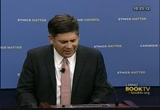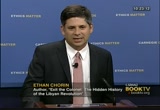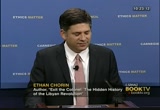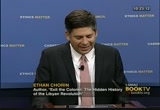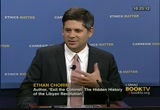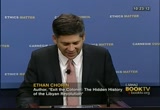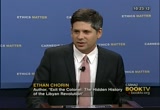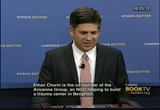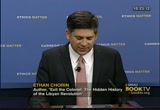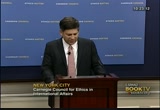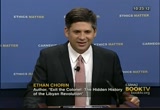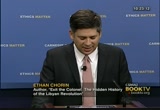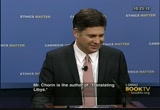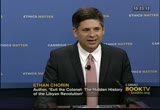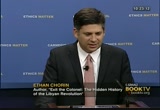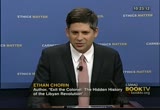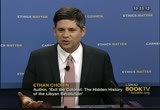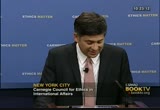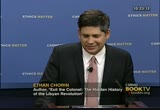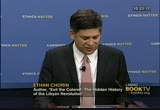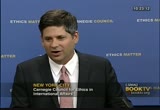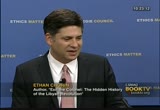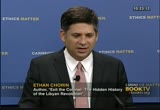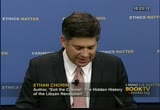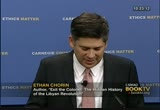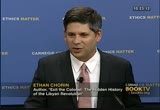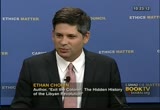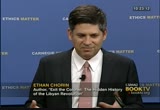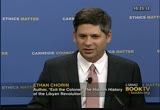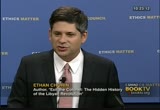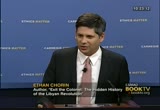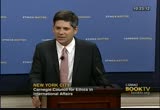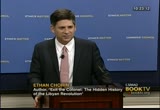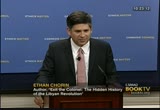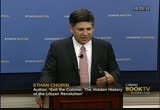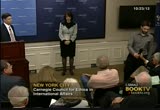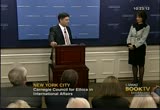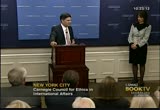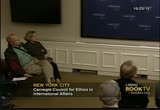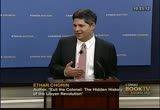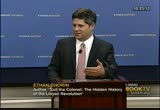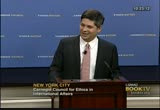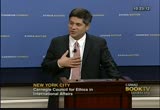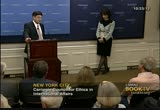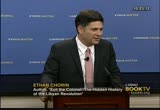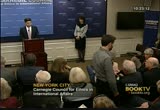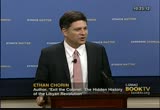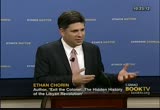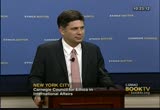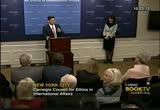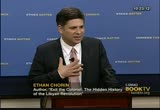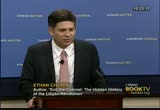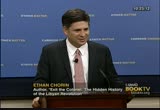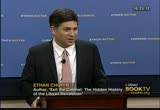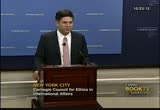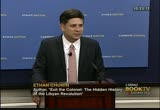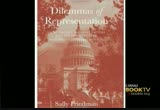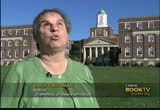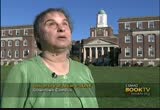tv Book TV CSPAN December 9, 2012 8:00pm-9:00pm EST
8:00 pm
you know, i was approached in early, literally i think a couple of weeks after the beginning of the revolution to about the idea of writing a book about a series of events that was literally just under way, and it was a bit of an issue trying to come up with a book because we have absolutely no idea how this was going to end. ..
quote
8:01 pm
>> to the degree of changeability and drama, you know, just continues, but, you know, there's a certain something about the region and the people and the cultures that's gripping, and the more that you get into it, the more you become passionate about it, and i'm certainly been very passionate about libya, and that's essentially, some of the reflections that i
8:02 pm
different contexts, whether think were taxi drivers, people poised to make lots of money, you know, middlemen between the regime and the private sector, former monarchy people who had been parliamentarians in the 60s and said, look, you know, we understand that there's this going on, but you realize that if you don't -- this is your time to pin the regime and kernel -- colonel gadhafi to the wall. if you don't express what you want from this without a clear end goal, things will not work out well, and
8:03 pm
kind of explained or increasingly explained by the news we're hearing in retrospect about what actually went on during some period of the gadhafi regime. you know, the book, i think thrrks four take aways, four main points that i try to make, and one of them is brought into profile by the presidential debate and the whole issue of what happened in benghazi on september 11th, what i call the myth of libya's ire -- ire veal -- irrelevance of u.s. policy. go back to the libyan's fate, one, the u.s. relations with lip ya has been, you know, u.s. has always looked at libya as something of a strange creature that we could use for certain --
8:04 pm
as a piece, of a strategy that had to do with the region as a whole. it was never looked at -- it was never seen as an object in and of itself. could start with the relation of the soviets, the eisenhower doctrine, and the united states' desire to push back soviet influence. libya was desperately pleading for u.s. attention back then, for aid, to get itself together, to stand on its own feet. this was before the discovery of oil, and the u.s. took a, well, you know, you're not really important as e just a minute, for example, and, you know, we'll think about it, and the result was that the prime minister of the time, you know, basically devised a plan to court the soviets and see if he could grab the united states' attention, and that happened. the next, you know, major event
8:05 pm
was the libya's and gadhafi's successful bid to change drastically the way oil pricing was conducted squeezing the independent oil companies occidental patrol yum, first and foremost, changing the system there there was a 50/50 split in libyan oil, and the consequence of that has come through to this day in temples of increasing the power of economic power of the gulf state, saudi arabia in particular. libya, and fast forward to the arab spring, you know, i think a very important point is libya became a -- sort of, you know, obama -- president obama in 2009 delivered his now famous new beginnings speech which he said he was going to stand with the
8:06 pm
arab people against tyranny and made a number of strong statements which he was not expected to be call upon so soon, but, you know, at the time, syria was looking, you know, as the sequential arab revolts came into being, there was very few places where the united states had an easy or even a conceivable influence -- edge to come in and do something where the consequences were not dramatic. they were at least, you know, there could be a pos five, you know, of course, egypt, a long-time ally anchor in the middle east, supportive of israel, and tunisia was a little bit, but, by that point, already crossed the threshold and ali was out, and syria, the comparisons with libya are quite, you know, very different. it's a multisectarian society with lots and lots of, you know,
8:07 pm
connections to other powers into which are iran, lebanon, israel, you know, where disrupting or changing that relationship could have all sorts of consequences which are unknown. libya presented a -- was unique that that the libyans -- there was a popular uprising, there was a program that had been put forth by a small group of people who had put themselves forward instead of on the first unofficial, then increasingly official spokeman of the program. this was a program that doesn't exist in syria at the moment, and this was an opportunity for, essentially, for president obama or the united states to make some good on much of the contents of the 2009 speech, which is very important. i think people are essentially losing sight of that. the second take away, i think,
8:08 pm
is the question of intelligence and what we've known gout what's going on in libya for the past 42 # # years. -- 42 years. there's remarkably little. this is, i think, ultimate -- a symptom of particular countries that go into the sanctions blackout because once the -- once that happens, you basically institutionally lose some knowledge, which is not regenerated as time goes on, and i think that's drk you know, when the situations change, and there needs to be some repository of knowledge to draw to figure out what's really going on, it's not there because the place has been off the map for quite sometime, and i think the -- the lack of institutional knowledge complicated the u.s. response to what was going on, not only in libya, but in other countries, other arab spring
8:09 pm
countries. the third interesting thing that i think is interesting is the issue of the u.s. and libya being actually the -- straw that broke the cam mel's -- camel's back, sorry for the -- [laughter] gad 2k3w5*d -- gadhafi made a series of agreement with the united states which he thought was going to save his regime, and there's a number of consequences of that, of those decisions, both of the u.s. and for libya, which did not turn out as he wanted. i'll go into that in a little bit more detail later. you know, i date the end of the regime really to the nature of the agreement that was made between the united states and, in particular, but the general, and libya in 2003. the fourth take away, i think, is the importance of follow-through, relating to all the points.
8:10 pm
there was a success in libya, and i've been in, and others share it, but this has been one of president obama's successes, and the danger is that once, as time goes on, as there's -- as the political vacuum moves forward and sort of -- if they don't move forward fast enough, you are going to have a major problem, and we're seeing, you can see evidence from that starting, you know, in general, i continue to be on the mystic about lib -- optimistic about libya's future. there's tremendous oil wells,78 billion proven reserves, back to
8:11 pm
the prewar production, and, you know, one of the most striking things is the political transitions taking place in terms going from a non-elected representation and articulation of goals to an elected -- elected -- a transitional government and then an elected government, both on the national and the local level, and that's -- you don't see that elsewhere, at least not in that striking as a fashion. in the rest of the book, i talk about the personality of gadhafi, what motivated him, and people argue that the personalities of the dictators themselves don't matter. in the case of libya, that's not quite true. gadhafi was a mercurial, i believe a quite intelligent person who had certain fixations
8:12 pm
and -- i'll try to be diplomatic here because -- [laughter] there's a lot of strangeness there that motivated his behavior in ways which i think were so bizarre that many of the people who are looking at this from the u.s. policy side -- felt, in a way, they were accustomed to the way of thinking about things, and that posed problems when you try to anticipate what he was going to do or respond to him. for example, you know, after the 1986 bombing in benghazi and tripoli, gadhafi was rumored to have gone into a tremendous funk for a period of several months, really income pass at a timed, and fast forward, and it looks like it happened after the beginning of the revolution. you know, that mentality seemed to provoke a deep rooted feeling
8:13 pm
that he would like -- that he needed to somehow both retaliate, and once he retaliated, exonerate himself. if you look at the major events in u.s., libya, and global libya relations over the years after the late 1980s, you know, you have the locker bombing, a seminal, you know, event in the -- what would be next, plunging libya into a period of extended sanctions, and so the -- you know that's -- everything -- all of the negotiations with the west happened after that point were somehow, once he was fingered for the lockerbie, you know, that criminal act, everything
8:14 pm
that was done, the bulgarian nurse's case is one example. we can talk about that a bit later, but there were a number of actions taken designed in some way to mitigate or deflect responsibility for that act and to try to get himself back into the good graces, if not his own people, then the outside world. i -- that's -- i'd like to talk a little bit about the in terms of the falling of the regime, and the bombing was a tremendous marker there in the sense it created a period for libya in which there were essentially, you know, the place was -- gadhafi left to stew in his own
8:15 pm
juices, you know, oil exports, you know, revenues declined greatly, up able to purchase weapons to the same rate. his arrange of maneuver in the outside world was greatly curtailed that personally affected him greatly, and it certainly affected the people around him who, you know,mented to be able to travel to spend their, you know, the income that they got from patronage. that environment created an atmosphere as well in which the islamic opposition could take greater root, and it was essentially, you know, became more and more -- there were a number of events which, because of our lack of understanding of what was going on in libya, would, in retrospect, signal, you know, to people who are watching this, that things were not going well in libya, that
8:16 pm
essentially, the people were getting increasingly frustrated with gadhafi and had the potential to be -- to explode. you have the -- another seminal event was a massacre in 1996 in which 1250 people were killed. this was by gadhafi's head under the supervision allegedly of gadhafi's head of internal intelligence. this was very important because the victims of that massacre were primarily political prisoners and from the eastern part of the country, and the east, you know, in a very tightly knit tribal society, an act of that mag magnitude basicy created cascading resentment which came to haunt gadhafi basically.
8:17 pm
this was -- that was a major event in creating reresentment in the regime. there was large barracks, there was the center of town, and this was, you know, basically occupied in many degrees, occupied territory, which, fast forward, you know, this explains a bit more of the east-west distinction, very important in moving through the spark of the great rebellion. another -- perhaps thee most critical inflection point in this was the -- in gadhafi's downward trajectory was the war in iraq. once this was underway, you
8:18 pm
know, the stage was set for two competing and rather disinjen narratives told by gadhafi to his people and the bush administration and the west to its people. the west, the story, you know, put forth on our side was that gadhafi was essentially unrepenitent up until point about lockerb iring's e, other terrorist activities, weapons of mass destruction, until the point he saw hussein pulled out of the spider hole, and -- the problem, of course, was that gadhafi had been suing for peace -- documented efforts dating back to 1992 just after the sanctions were starting to be, the u.n. sanctions started to kick in, and they were, you
8:19 pm
know, at least ten documented attempts by gadhafi where gadhafiments the -- wants the international community to agree to let him back in, create the conditions for reversal, and so that narrative is not quite accurate. the weapons of mass destruction as well. gadhafi had a tendency for years to collect large amounts of weapons which were defective or nobody knew how to use, and this was -- this was not -- again, i'm not a nuclear expert, but i've certainly read most of the public sources on this subject, and the consensus that i see -- well, there's not a consensus, but there is a feeling among prominent scientists and observers that gadhafi was very far from a nuclear weapon, and
8:20 pm
further, the u.s. really wasn't -- the community really wasn't concerned about gadhafi, which was the other thing. gadhafi believes that he was the focus of u.s. attention or should be, and that -- and, you know, he must do something to escape this -- undoubtedly would be a very unpleasant consequence for himself. to the libyan people, of course, here's the concept of linkage coming in, gadhafi using it to say that, look, i've managed to pull a rabbit out of the hat. we were under sanctions for eight-plus years, depending on which entity you talk about, and here's this -- i managed to get myself out of it, and us, and libya will be a prosperous country moving forward. you know, there was some people -- gadhafi aids, who in a moment of indiscretion confessed to us they thought they were all
8:21 pm
stunned that this agreement took place, and they never believed that quid pro quo could happen, and, of course, the u.s., here's where one of the major arguments in the book was that the regime, the administration of the united states was so eager at this point to try to find a positive result of the iraq war that they were willing to leave and to gain information that would lead to, you know, a fortified anti-terrorism policy, and it was a bonus of the weapons of mass destruction, counter proliferation issue, that all of this stuff was fantastic, and, you know, we could leave the details for later, and so, which was a -- in my view, a huge mistake. if you look at the lockerbie agreement, itself, dictated under the terms under which the
8:22 pm
payments to the victims of pan-am 103 were dispersed, each of those things -- the agreement itself negotiated by lawyers out of the families and the libyan government. the united states was not a party to that agreement; yet, that agreement made it very clear that moneys would not be transferred unless certain diplomatic objectives or milestones were reached. gadhafi, in typical fashion, turnedded his worst enemies, his greatest anti-you know, lobby, into his greatest tools for, you know, getting out of the mess that he was in. this process continued into many other incidents which i talk about at great length in the book. essentially, so you have divergent narratives.
8:23 pm
the -- you know, the other issue is that, in fact, as we were trying to -- the issue of human rights seems to take a great backseat to the other goals i just mentioned, and in retrospect as informs game out by the programs run by the caa, for example, to bring individuals to libya, believer them for torture, you know, looking at a policy of trying to pressure gadhafi towards economic reform and improved human rights, all he has to do is say, look, you know, you're giving us -- look what you're doing. it underminds the premise that actually reform is the -- and human rights are one of the major goals.
8:24 pm
a very interesting portion of the story, i think, is the question of the makeover which is -- it's a title of one of the chapters which is once both parties, the libyans and the u.s., agreed this was the path going forward, a joint story had to be created, and, of course, gadhafi was not exactly the best character actor for reform so, you know, somebody else needed to be found to play that role, and who better than faithful islam leader, so-called arab parent, islam, you know, one of many, you know, seven siblings, and many of them came into their adulthood during this very time, and one thing that needed to be
8:25 pm
done with them, you know, needed some sort of a role, and this was the most charismatic, by many accounts, the most subject of all of them, and spared some of the influences that were brought to bear on some of his brothers who took other courses. you know, so the issue -- here's the central issue is that it actually -- and i don't take a stand in the book about what is islam's intentions were. clearly, he developed a rather long resumé of reform-building efforts over the course of the first years, and from, you know, hostage negotiations to helping set up new media companies
8:26 pm
pushing the envelope of what could be said under the regime, and, you know, he became the advocate for the disenfranchisedded or the oppressed or victims of gadhafi 's more atrocious acts. the question of how far he really wanted to go, did he see libya becoming a new, you know -- what was the model he was following? many people commented on this. again, i -- what's most interesting, for me in the book, is the fact that through his efforts, and regardless of what that, again, what value judgment or what goal he was looking towards, he created a group of people that became almost like an intermediate class of regime, non-regime people who were recognized by the west as reformers and could play an active role in solidifying the -- this -- at the very
8:27 pm
least, the appearance of reform, and probably to some extent, you know, reform up to a point. basically, economic reform. gadhafi senior made a clear he was never willing to compromise on the issue of political reform, and all of the sort of, very interesting set of conversations between the sources that i quote in the book, the describing of the -- the arguments and disputes and the negotiations to some degree between people of people of islam chose to advance some of his reformist policies, and, you know, what gadhafi, sr. was willing to permit. as time went on, there was longer term aides that this was not good, that he was going too far. when the revolution occurred, and i think this is a critical
8:28 pm
fact, that the, you know, these -- this group of individuals was able to play a kind of a mediating role and convince -- actually make a case to the united states that through individuals like ambassador stevens and secretary clinton, that there was actually someone to talk to. the -- the head of the national economic development board, part of the safe reform efforts, became the -- you know, the -- you know, the foreign minister/prime minister into the transitional council and now head of the head of the non-islamic party in libya right now. this, you know, you could say that these -- the human rights lawyer who interacted very frequently with the president of
8:29 pm
the ntc and the person who launched that, that period in recent history. you know, this is a group of people that knew each other, communicated with each other, all had their own causes and networks, and talking about social networks as a factor in the -- in the arab spring, in terms of libya, it really wasn't facebook or twitter or things like this. it was al jazeera, and al jazeera brought the spotlight to the -- to what was going on in libya when no one else knew exactly what was happening, but these networks, these individuals, did what safe may not have been able to do, if only because he was the son of gadhafi. you know, the rest of the book talks about the actual unfolding of the revolution, which is really a fantastic story, and
8:30 pm
the whole question of what was happening in benghazi and tripoli, you know, in the early, early days after the arrests on the 15 #th -- 15th of february. it's really quite a stunning story, and i don't think it's been told in english to this -- in in degree of detail. i tried hard. i knew a lot of people in ben gadhafiments city, officials here, and then in europe, and they relied on local sources. the -- and the whole issue of how the united states became motivated to get involved is interesting, and, again, i go back to the issue of intelligence and what people didn't know about libya and what assumptions people were making. you know, it seemed like washington, between the the white house and state department, everybody had an idea of what should be done,
8:31 pm
advocatings on both sides, a ready group of the individuals, the power, and given rise to those looking for an opportunity to implement a responsibility to protect scenario that would succeed so that's a whole, you know, that's a whole section, again, as to what -- how did we come to intervene, and why was that actually a good idea? the next question, of course, is the one that everybody's talking about now, which i'll leave teem for questions, which is where is libya headed next? you know, with regards to what happens this benghazi, i think one needs to take -- regardless of all of the chaos that's happening, step back, go up several thousand feet, and look at the process over a microphone longer period of time.
8:32 pm
this is, you know, we're still a year into the revolution. nobody really expected -- many libyans expected this is going to be a shorter and more pleasant experience than it has been, and there's been confrontation of a brutal reality, but back to libya over the last year, i've seen remarkable stories of people who have -- ex-patriots who came back, droppedded everything to jobs in europe and the states to help build infrastructure, the way in which the local elections were held in ben zazi -- benghazi in may, and there's a counter story to everything. this is still quite -- there's a number of things to be very optimistic about. the fact there were tens of thousands of people who after the assassination of, killing, assassination of ambassador
8:33 pm
stevens took to the streets in benghazi in protests against extremism. they were slow on the uptake when shrines were decimated in tripoli, but there's the feeling that the revolution is being hijacked, and we're going to do something about it. whether that's -- i'm also interested to see how, you know, the potential parallel right now between what's happened in benghazi and the attack and what happens back in july of 2011 when the rebels assassinated one in benghazi. that event precipitated -- tripoli was still not liberated, and people thought, oh, my god, this is the end of the revolution. gadhafi's going to come back and wipe everybody out. in fact, what happened, the head at the time, used that as a
8:34 pm
means of essentially quieting his detractors and consolidating power and move forward with the onslaught in tripoli. to the extent that we have now what appears to be a progressive, more forceful, and saying that in qualifying. i don't have as much detail as i'd like, the new prime minister, and, you know, there's an opportunity here to consolidate and maybe something better will come out of this in the near future. any -- very happy to take any questions. [applause] >> thank you. [applause] i know that many of us have questions, and i just ask that you wait until the microphone comes to you and you identify yourself. starting over here.
8:35 pm
>> i'm tyler beatie, and we hear a lot about tribal militias making things messy. can you comment on that? >> they are making things complicated and messy, that's forsure. you know, essentially, you know, the revolution was won in pockets, and each region, basically, had its own militia. many regions had their own, you know, of course, a region is tied to some degree, not completely, but to a tribal identity, then used as a trigger for conflict with a neighboring tribal identity. one town very much in the news, a coastal town, center of the coast there, suffered shellings for, you know, relentless shellings for many weeks creating a degree of resentment,
8:36 pm
and, essentially, there's now a conflict between -- a renewed conflict between those militias, once a loyalist, and those kinds of tensions can easily spread into other areas. the real problem right now is security is issue number one in libya right now, and the problem is the militias are also, despite their many colors, from, you know, good to bad to however you want to judge them, are, you know, are the guaranteers of security in the locality, and until there's a strong, you know, local government, at what point does the transition occur? there's efforts, many thousands of people, rebels integrated into the national army to -- there's been weapons collection programs, things like this, but, you know, in libya, there's so much weaponry there that even the most successful weapon collection program will leave
8:37 pm
many, many more un-- you know, it's a huge problem, so, sorry, i hope that answers somewhat. >> hi, david musher. my question has to do with to the means -- do the means justify the end? this was a civil war which was contained completely within libya, granted america and certainly europe had tremendous financial interests. my question for you, really, is what are the future political consequences of our having acted in internal affairs in this country, and what type of precedent has this set? >> okay. excellent question. i would actually answer that first by saying that the united
8:38 pm
states and west was not a neutral party in libya, and, in fact, from the moment that the sanctions were lifted, particularly, the u.n. sanctions, and then the arms embargo in 2004, a flood of weaponry came into libya. most of it was over a billion dollars, which, in absolute terms, not that great, but relative to what was there before and what the purposes of what it was used for created a -- i would say an unfair playing field. you couldn't say that we were -- there was not a neutral issue as far as we were concerned. that process, as i argue in the book, was very much tieded to the whole issue of not -- not putting accountability in place for, you know, what we would get and what gadhafi could not do as a result of the agreement.
8:39 pm
a lot of people, you know, i think -- that weaponry, again, much of it was small arms, surveillance equipment, you know, all of the sort of things you would need to put down a popular revolt, was put in the hands of the regime. essentially, due to complicity and lack of attention by parties in the west. that's one. that's one thing. as far as what precedent is set, i mean, civil war, you know, civil wars are, you know, that's a deep question, and i don't, you know, i think that the the preponderance, you know, the rebels themselves managed to present a case and ask for protection. the whole issue of the responsibility -- i assume you're referring to going beyond the speedometer to protect
8:40 pm
civilians and playing -- >> [inaudible] >> basis for international law -- what's that like for the future? >> well, i think in this case, in terms of the responsibility of the set to protect doctrine is one of the reasons the united states wanted to intervene, you know, on some level in this conflict was to beef up the case for the r2t doctrine, and intergnarl law is a fuzzy, sort of a subject and so some degree, built on a large degree on precedent. i have to say the united states intervenedded in libya back in -- intervened in libya back in the early 1800s to support basically to fund a rebellion in benghazi that would move forward taking out the unfriendly --
8:41 pm
>> [inaudible] >> they were attacking our ships, and, well, yeah, i mean, we could -- >> [inaudible] >> what would have happened if here's the preventative doctrine, and what would have happenedded, and president obama made this comment in the debate. if we left gadhafi in power, you know, with, you know, agitated, with his mercurial mood and tendency to blow up lots of airplanes, you know, i think that would have been an absolute disaster. i'm not an international lawyer. i'm not in the position to debate the finer points of that, but i think effectively, there was -- this was a well-played intervention. in some way, it's an evening of the playing field, because we were responsible in a large degree in empowering gadhafi for several year, and giving him the means in which to suppress his
8:42 pm
own people. i know i'm going to get some flak for -- >> james starkman. in the perspective of the success of the nato enforced u.s. backed no-fly zone in libya, i'd like to ask you the same question that bob asked the two candidates last night which is it snuck by most people. what about a no-fly zone in syria? there's military differences, russian, imported anti-aircraft, so sophisticated things, but the answer that boast romney and obama gave was, no, no military involvement. no-fly zone is a step towards military environment, but not a full military environment. what's your -- way would be your answer to that question? >> well, frankly, i think that the, you know, this is some of
8:43 pm
the calculation that went into the intervention in libya was if we intervened in syria, we already have done this. that's too flipped, but that's what one -- personally, i, you know, if in that position, i would be in favor of the no-fly zone. i think that -- so would the turks. they are saying, look, you're repeating history over and over here again. >> [inaudible] >> what i think is problematic is offering -- is sending, you know, certain caliber weapons to opposition which we don't know who they are, and that's also repeating a bad precedent. you don't want the weapons to fall into the wrong hands. you know, what happened to the 20,000 service-to-air missiles supposedly in gadhafi -- actually, a whole other answer to that -- but, yeah, i mean, i think -- i would think that if you're going to follow that
8:44 pm
rationale, you know, ultimately, that would make sense. safe havens, yeah. >> i'd like to ask you if you could -- >> [inaudible] >> sorry, howard lentner. give detail, i think, your second major appointment of the book, that is to say that you said that the agreement that gadhafi made with the united states really contributed to eroding his power and creating this situation in libya, and maybe by an example, could you tell us what you mean by that? i mean, how exactly did that work? i wonder if you'd just evaluate that in terms of whether you think that that technique of making an agreement with a tyrant might be useful in other
8:45 pm
situations that -- that same mechanism would be able to work to erode his power. >> well, you know, i think, you know, there was tremendous amount of disagreement, discord in washington about what, you know, the terms of the abuse, the multiple agreements with gadhafi, and one of the arguments that i heard from several seep your officials was that, look, any light into that darkness would have eventually created -- give people new ideas, understand better what's on the outside, that they don't have these things, that, i mean, that argument is fairly prominent. i think in the case of libya, you know, another, you know, i guess, the notion that people don't rebel when they are under the most severe pressure, when
8:46 pm
they are scrambling to fill their very basic needs. they rebel when they are a bit more aware and have some level of resources to act, and i think by what that agreement -- what those agreements did was give the libyan people, you know, some breathing space and allowed for networks as i talked about before, the ability for people who otherwise would not community kate with each other. only the victims of the scandal, which was an infection of 461 members or, you know, varies, but infants with hiv, which now former regime members claim was a deliberate act on the part of the regime. there were, you know, individuals such as, you know, these sort of luminaries of the immediate post-revolution were all part of these campaigns,
8:47 pm
and, you know, the person who was publicly coming out and saying, realm, we'll give you more room to air griecheses, and when you do, we'll pay you compensation, and, you know, we'll all be back into the fold, but what it actually did when the things became, you know, when the events in tunisia broke out, and in egypt, that empowered, and that result was lines of communication that could readily link various people together into some kind of a cohesive, temporary command center. that answer your question a little? i think that, yes, i mean, you could apply that to, you know, north korea presumably, but how do you do that? i don't know. in north korea, there was app opportunity, and gadhafi had a strong motive.
8:48 pm
>> i'm david hunt. you've been in benghazi. your group is billing a trauma center there. i wonder if you would comment on the assassination of ambassador stevens. do you think, for example, that the state department was wise in letting him even go down there given it was 9/11? i mean, 9/11, seems to me, that everybody in washington or maybe in libya, too, forgot there was a big anniversary coming up, and, as you know, because you were in the embassy there when the chief of mission goes off, sends a cable to washington, says i'm going down, be back in a couple days. they concur or not. it just seems to me he walked into a lion's den without anybody really aware of what the situation was. >> well, i just a minor note, our efforts in benghazi were actually to have teaching
8:49 pm
hospitals in the united states and their local counterparts in benghazi. i can't claim to build a trauma center. we facilitated a number of training programs we hope go forward, but as far as what's, you know, what was going on there, you know, i wrote a piece, also, in which i argue that the, you know, there's systemic issues. that's not -- that's not a romney-obama issue. this is a sort of a systemic issue within several, you know, u.s. government agencies, which send people out into the field is that, you know, you tend to have this super response to certain situations where you got the fortress and people can't, you know, barely can get in and out, and you want to ask, you know, what exactly are they doing there, versus transitional installations, whether they are, i mean, when i first got to
8:50 pm
libya, the united states liaison office. it was not an embassy, but a transition. we were living in a hotel. the state department doesn't cope with those situations as well as maybe they should, and secretary clinton came forward and said on some levels, you know, taking speedometer for that -- responsibility for that, and presumably, there's investigations, and people will look into how to better protect the bureaucracy work better for -- to protect u.s. diplomats. one has to say against that that, you know, if you look at the record against how many foreign officers killed in the line of duty or ambassadors, it's very few. they must be doing a good -- a very good job in many instances, but there seem to be certain types of situations which are more prone to there to be breakdowns. when i was based in tripoli, we had no virtually no protection
8:51 pm
whatsoever. we wrote similar cables says, you know, can you please, yes, we understand gadhafi's security app rase toc is prevalent, but that mean we're not exposed? a lot of people were relieved when our tours were over for that reason. there's antedotes of not just me saying this, but from all over the place, all over the place is an exaggeration. the middle east, the state department's asked to put more and more people in more and more dangerous situations, and there's a limited budget. congress has a lot to do with that, people screaming at state department saying they are at fault here, some of the same people refusing to authorize funds for that. some of the arguments that were begin, -- given, you know, in favor of defense are not quite, you know, it's a complicated issue. the budget and allocations negotiation between, you know, the president, the congress, and
8:52 pm
with input from the state department, but to answer the question more directly, i don't know why, you know -- we were certainly concerned before we went in there that it was the anniversary of september 11th, not a great time to be riding around. we didn't see ourselves, but we were, you know, not prominent targets, but we are westerners, and we stick out in a place like benghazi. there had been a pattern of attacks in benghazi over the course of the previous six months, and they were all high profile officials or international diplomats. one would have to say that was a prominent target so unexplained question -- i have not heard any convincing answers as to why that was the case. cultural center, he was in the in benghazi to meet with us because i heard he was in town when i arrived, and that made it
8:53 pm
into various press club, you know, the media, various places, and, you know, there's so much misinformation running around, and given the campaign ape the rest of it r given the campaign and the rest of it, that might be somewhat natural. i don't know. i assume those answers will come out. >> last question. >> hi, susan ball. i was curious when you said the oil production was back up to normal, or when it was before. who is getting the profit from that oil at this point? >> well, you know, libya is an operating environment that's very difficult, and actually, very interesting fact, just before many months before the revolution, a couple of major u.s. oil companies had declined to renew their licenses. libyans made it very difficult for u.s. companies to recruit
8:54 pm
early investments and signing bonuses for exploration licenses, beyond the point, but, basically, at the moment, you know, the production is underway. the administrative processes for converting that money, both into the civil sector, budgets, and into the hands of people who need it in libya is not working properly. as far as the oil companies, themselves, i'm sure they are taking care of themselves so -- and, you know, libya's a ultimately a, you know, it's got the largest reserves in africa. it's -- much of the land is relatively unexplored because people have not been in there for very long. i don't think there's a shortage of long term interest in libya on the part of u.s. oil companies and related matters. >> thank you very much for
8:55 pm
illuminating some of the problems in libya. [applause] i invite the rest of you to join us in continuing the conversation. [applause] >> thank you. >> very good. >> it was okay? >> no, no, it was very good. you raised a lot. >> so the title of the book is "dilemmas of representation," and it's about a couple things. it is about the limits of representation. i reallimented to show -- i was
8:56 pm
really interested in representation, and i wanted to show that when members of congress, quote, represent their districts, that representation can really mean a lot of different things to different congress people. it's not one size fits all, and i really wanted to show the choices, members of congress were making, and i reallimented the reader to think -- really wanted the reader to think, so of all of those choices what style of representation does the reader think is best? that's one of the advantages of profiling ten members of congress. they were only ten members of congress, but you really could get an in-depth picture in terms of local, national distinction, which i wrote down in a lot of different ways so, you know, it's not as simple as that, but we found, a, that local politics still mattered to an enormous extent. there's any number of stories in the book highlighting local
8:57 pm
politics, constituency service, members of congress helping individuals for, me, local is the stuff we're used to seeing, bringing projects to the district, doing constituency service, just interpersonally hanging out with con sitwents, being from the district and really highlighting your roots to your con sitwents. that's the kind of sufficient that congress literature really talked about. for me, national was about bringing national -- discussions of national issues back home to the district, was -- was bringing in national party help or national figures, was coming
8:58 pm
from outside the district so it was anything outside the district that was -- that was going on nationally. i think in some ways, you know, that politics has not changed. the local is there. i think the national is there, too. lots of congress people talking about local issue as we know today, lots of congressmen, congress people being -- being partisan, taking the stands of their parties, with just being involved in whatever's going on of the time. you know, be it the contract with america, then be it women's issues, be it issues of minorities or immigration, just lots of national examples, and that in a lot of ways, local and national were connected. obviously, the national politics was interested to me as it played out in local districts. i was also, given that i was --
8:59 pm
i was surprised by how local things still were. i know it's a book that's supposed to talk about and highlight national politics, but i was surprised that -- how local politics still was, and the other thing that impressed me within -- i mean, we talk a lot that members of congress are supposed to, quote, represent their constituency, and tried to show, you know, what's "representation" mean? it means a lot of different things, but within that, i guess i was impressed that members of congress have to put their -- really were able to put their own stamp on what they were doing. it mattered who a particular representative was. the representatives differed from their preed predecessors te extent on issues they focused on or how they dealt with the constituency, and a lot o
128 Views
IN COLLECTIONS
CSPAN2 Television Archive
Television Archive  Television Archive News Search Service
Television Archive News Search Service 
Uploaded by TV Archive on

 Live Music Archive
Live Music Archive Librivox Free Audio
Librivox Free Audio Metropolitan Museum
Metropolitan Museum Cleveland Museum of Art
Cleveland Museum of Art Internet Arcade
Internet Arcade Console Living Room
Console Living Room Books to Borrow
Books to Borrow Open Library
Open Library TV News
TV News Understanding 9/11
Understanding 9/11